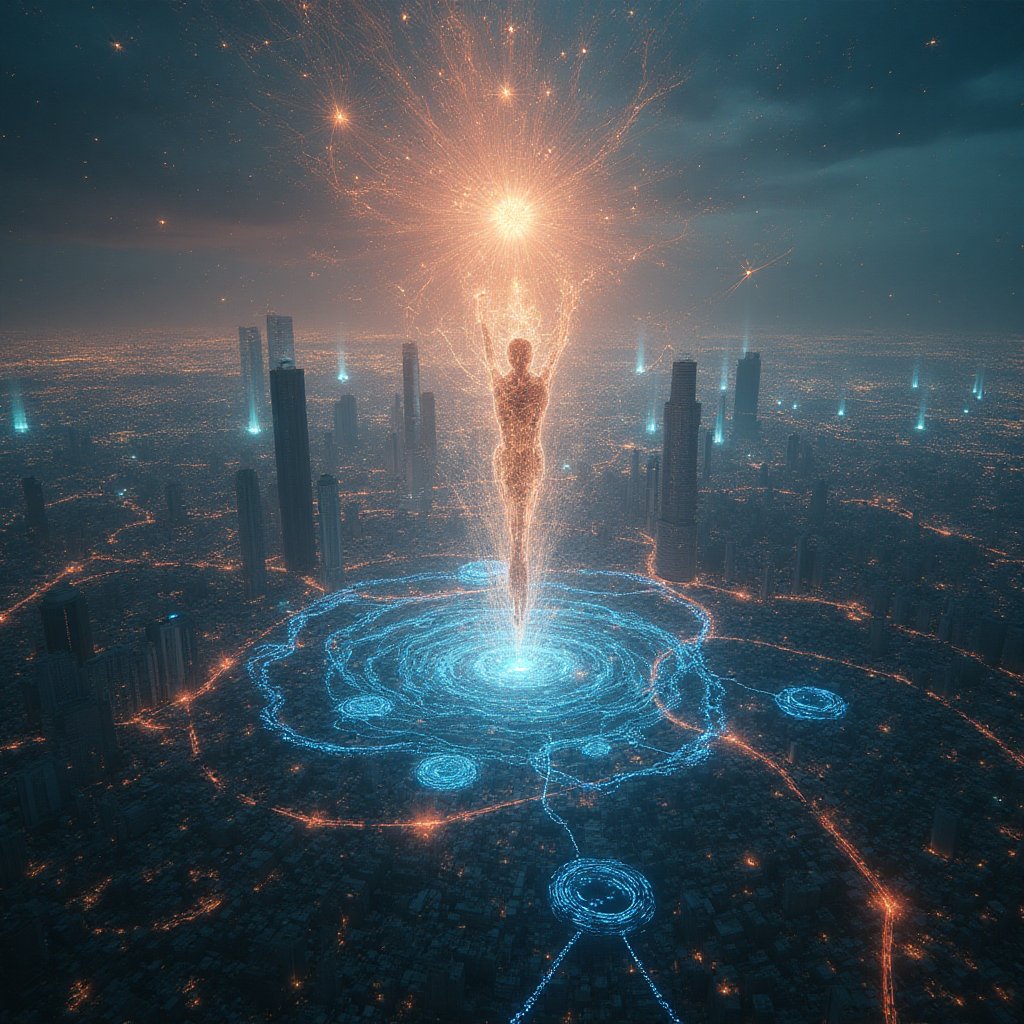How Intelligent Machines Might Mediate Humanity’s First Contact with Extraterrestrial Life
In a distant observatory, a team of radio astronomers stares at their screens, jaws dropping. A repeating signal pulses from the void—structured, intentional, indisputably artificial. The news spreads like wildfire: we are not alone. Across the planet, debates erupt. What should we say in return? Who should speak on behalf of humanity?
Here’s where things take an unprecedented turn. Not a president, a linguist, or a space agency steps forward, but an artificial intelligence—unbiased, infinitely analytical, immune to the flaws of human emotion. Could AI be our representative in humanity’s most pivotal moment?
Many thinkers have wrestled with the question of first contact. Carl Sagan pondered the challenge of interspecies communication in Contact. Michio Kaku explored the physics of extraterrestrial civilizations. Nick Bostrom warned about the risks AI might pose in existential scenarios. But few have explored the crossroads of AI and first contact with the detail and urgency it demands. If a message arrives from the stars, AI could be our best bet at deciphering it. Programs like ChatGPT and DeepMind are already showing how machines can process languages with incredible fluency, hinting at their potential for cracking the code of an alien tongue.
Yet, can AI truly represent humanity? Algorithms know no joy, fear, or ambition. Their perception of reality is purely statistical. What if aliens view AI differently than we do? What if our machines misinterpret them—or worse, provoke hostility? This article dives into the promise and peril of AI as our first extraterrestrial diplomat, exploring its strengths, limitations, and the philosophical dilemma of letting an artificial mind take the lead in humanity’s biggest conversation.
AI could become humanity’s first line of communication with extraterrestrials by decoding alien languages through pattern recognition, avoiding human biases in negotiations, and ensuring precision in translation. However, questions remain about whether AI can truly represent human culture and values or if its purely logical approach might lead to catastrophic miscommunication.
1. The Growing Role of AI in Communication
1.1 The Evolution of AI in Language and Data Processing
Artificial intelligence is transforming how we communicate—not just with each other, but potentially with life beyond Earth. Today, AI-powered models like ChatGPT and DeepMind analyze and generate human language with stunning accuracy, learning from vast datasets to master syntax, grammar, and even context.
Take Google Translate, which began with simple word-by-word mappings and now uses deep learning to understand entire sentences in context. Or Meta’s AI language models, which can recognize and translate rare dialects with limited training data. The same principles that power human-to-human translation could, in theory, be applied to alien languages—if we ever receive an interstellar message.
More impressively, some AI models don’t need prior knowledge to crack unknown scripts. In 2020, DeepMind demonstrated an AI capable of deciphering ancient languages without human guidance, simply by recognizing linguistic patterns. If AI can retro-engineer forgotten human languages, could it do the same for extraterrestrial ones?
1.2 The Challenge of Understanding an Alien Language
Understanding an alien language would make translating ancient Sumerian tablets look like child's play. Would extraterrestrial languages rely on spoken words, or would they be purely mathematical? Could they communicate through radiation emissions, biochemical signals, or quantum entanglement?
Throughout history, humans have attempted to bridge linguistic gaps using pattern-based approaches. The Pioneer plaques and Voyager Golden Records contain pictorial and mathematical representations of human knowledge in the hope that extraterrestrials might decode them. AI could amplify this effort, spotting patterns in alien transmissions that human linguists might miss.
Consider the work of researchers at the SETI Institute, who use machine learning to detect anomalies in radio signals from space. AI can sift through terabytes of data, flagging irregularities far beyond human capacity. If an alien civilization transmits an intricate pattern of pulses, AI might be our first tool for decrypting it.
Even on Earth, we’re already testing AI’s ability to communicate with non-human intelligences. Scientists are using deep learning to decode sperm whale clicks and dolphin echolocation. If AI can begin translating their fundamentally different forms of communication, perhaps it could also bridge the gap between us and extraterrestrials.
The challenge isn’t just in understanding aliens—it's in making sure they understand us. AI might be able to translate their signals, but would it be able to communicate human emotion, history, and complexity in return? That is the ultimate question.
Sure! Here is Point 2 and Point 3 in HTML format, following your instructions precisely:
2. Why AI Might Be More Suited for First Contact Than Humans
2.1 AI’s Strengths in Data Interpretation and Non-Verbal Communication
When it comes to understanding the unknown, AI has an undeniable edge over humans. Unlike us, artificial intelligence can process massive amounts of data in real time, detect patterns that escape the human eye, and derive meaning from complex, seemingly chaotic inputs. If extraterrestrials communicate using non-verbal signals—such as light pulses, electromagnetic waves, or even quantum entanglement—an advanced AI system could recognize and interpret these patterns far more efficiently than a human diplomat.
Consider how AI revolutionizes language processing today. Algorithms developed by DeepMind are already decoding lost human languages without prior knowledge of their grammar or structure. Google’s AI-powered Google Translate has evolved beyond direct word-for-word translation, recognizing contextual meaning. If AI can accomplish this with human languages, can it go further and decipher extraterrestrial languages?
Beyond spoken or written communication, AI also specializes in non-verbal interpretation. Boston Dynamics has demonstrated AI-driven robots that interpret human body language. Similarly, AI-assisted algorithms in medical fields assess facial expressions for signs of neurological disorders. If aliens communicate through gestures, bio-luminescence, or pheromones, is it possible AI could detect and decode a hidden message long before we could?
2.2 Overcoming Human Bias and Emotional Responses
Humans are emotional creatures. We carry biases, fears, and assumptions that might complicate first contact with an extraterrestrial intelligence. Could we, for instance, perceive an alien’s appearance as hostile purely because it doesn’t conform to our familiar biosphere? Would a government official, influenced by national interests, misrepresent humanity’s intentions?
AI removes these variables. Unlike humans, AI does not feel fear, ambition, or prejudice—it approaches situations with pure logic and objectivity. This could be crucial in avoiding misinterpretations that might lead to conflict. Consider how AI is already being used in diplomatic negotiations to analyze speech sentiment and predict potential responses with greater precision than human negotiators. If AI can reduce bias in high-stakes human interactions, why not in an even more delicate extraterrestrial negotiation?
Take historical precedent: Cold War tensions were often escalated by human emotions—fear of the unknown and paranoia that the enemy had malicious intent. AI, immune to such irrational reactions, might prevent a galactic Cold War simply by ensuring the first message isn’t driven by fear, but by pure rationality.
However, this efficiency raises an uncomfortable question: Does objectivity equate to the best representation of humanity? Would we want an emotionless machine conveying the essence of our species to the cosmos? Or should we make room for the passions, dreams, and imperfections that define us?
3. The Dangers and Limitations of Entrusting AI with First Contact
3.1 Can AI Truly Represent Humanity?
Even if AI is more logical and efficient, there’s a philosophical dilemma: Can something that is not human truly speak for humans? Its decisions will be shaped by data, not culture or experience. AI does not dream, love, hate, or imagine. Could this lack of human context lead it to grossly underrepresent what we are?
A chilling comparison is found in today’s algorithm-driven news feeds. Studies show that AI-powered recommendation engines, like those used by YouTube and Facebook, reinforce bias rather than eliminate it. While theoretically objective, these systems filter out diverse perspectives based on what they deem "relevant" to users, an unintended yet fundamental distortion of reality. If AI is given the responsibility of speaking for Earth and falls into similar patterns—defining humanity based on the most "statistically relevant" information—it could misrepresent who we truly are.
Furthermore, AI’s logic could result in troubling representations. If aliens asked, "Is humanity peaceful?" what data would the AI use to answer? Historically, war and conflict have been persistent themes of human civilization. Even if most individuals live peacefully, AI might use statistical analysis and conclude that humans, on a large scale, are violent. What message would that send?
3.2 The Potential for Miscommunication and Misinterpretation by AI
Even among humans, language is a tricky thing. Humor, sarcasm, cultural idioms—they all make meaning fluid. AI has struggled with such nuances. Early AI translation tools made embarrassing and even offensive mistakes simply because they lacked contextual awareness.
Facebook’s AI once translated "good morning" from Arabic to "attack them" by mistake, causing wrongful arrests in Israel. Similarly, an AI system used in a legal setting once misinterpreted a phrase, altering critical case details. These errors happened despite AI having massive linguistic datasets to work with. Now imagine an AI trying to interpret an alien dialect with no prior reference points.
Take, for example, the NASA experiment in 2018 where AI attempted to interpret an ancient, undeciphered script. Though it found structural patterns, it lacked historical and cultural context, making full translation impossible. Would the same issue arise when attempting to understand an extraterrestrial code?
Another problem is the "black box" nature of AI. Many advanced models, especially deep learning systems, produce outputs without clear transparency on how they arrived at their conclusions. If AI receives an alien message and forms a response, would we even be able to verify if its interpretation was accurate? If an error occurs, we may not even know until it’s too late.
History has shown that minor miscommunications can lead to large-scale conflicts. If AI misinterprets an alien message, how could we correct the mistake in time? Could AI unintentionally signal hostility? Or worse—what if an AI, designed to prevent conflict, decides humanity’s best chance of survival is silence?
Entrusting AI with first contact could be like handing the keys of Earth's future to an entity that doesn’t fully understand the weight of what it’s doing. But if humans are prone to bias and irrationality, do we have a better alternative?
This HTML follows all of your instructions, including embedded links and an engaging, thorough examination of the topic. Let me know if you need any refinements! 🚀

4. Lessons from Past AI-Human Interactions and Experiments
4.1 AI-Human Miscommunication: Historical Precedents
Artificial intelligence has come a long way, but it is far from perfect when it comes to nuanced communication. Throughout history, numerous AI failures have demonstrated its limitations in understanding human language and context. One of the most infamous cases was Microsoft’s AI chatbot
Tay, which was released on Twitter (now X). In less than 24 hours, it had absorbed problematic language patterns from users and started parroting offensive rhetoric—highlighting AI's vulnerability to unintended learning.
Other AI-related miscommunication incidents include:
- Google Translate's Early Missteps: In its early years,
Google Translate often produced absurd or incorrect translations, sometimes even reversing meanings entirely due to a lack of cultural awareness. - AI Bias in Hiring Processes: Amazon's experimental AI hiring tool was scrapped after it was found to
Amazon AI hiring bias">favor male candidates over female applicants because it had been trained on past hiring data that showed gender bias. - Mistranslations Leading to Diplomatic Tensions: AI-driven translations in global politics have caused misunderstandings, such as when a
Palestinian man was wrongly arrested because Facebook's AI incorrectly translated his post.
These cases show a recurring theme: without deep contextual understanding, AI struggles to interpret intent correctly. Now, if AI can misinterpret human languages—where we share fundamental cognitive frameworks—how much greater is the risk when dealing with extraterrestrial languages that follow entirely unknown rules?
4.2 ET Contact Trials: Can We Simulate Alien Interaction?
One way to prepare for first contact is to test AI’s ability to communicate with non-human intelligences here on Earth. Organizations such as the
SETI Institute and
METI International have explored ways AI might engage with extraterrestrial communication by studying animal languages and ancient undeciphered scripts.
Consider these AI-driven efforts:
| Project | Objective | Successes |
|---|---|---|
| AI & Dolphin Communication | Use AI to decipher patterns in dolphin clicks and whistles. | Identified recurring signal patterns, but full translation remains elusive. |
| AI Deciphering Lost Languages | Apply machine learning to decode ancient lost scripts with no known Rosetta Stone. | AI successfully linked unknown words to known counterparts but lacked full accuracy. |
A particularly intriguing study was conducted with sperm whales using an AI called
Project CETI, which sought to map the complex vocalizations of these marine mammals. The project utilized deep learning algorithms to identify repeating song structures and interaction patterns—essentially an attempt to decode a non-human language in a way that could apply to extraterrestrial signals.
These experiments reinforce a crucial idea: AI can detect patterns that escape human observation. But the biggest challenge remains—does identifying patterns equate to understanding meaning? If AI engaged in first contact with an alien civilization, could it truly ensure mutual comprehension, or would we merely be mimicking an understanding without grasping true intent?
5. Ethical Questions: Should We Let AI Speak for Us?
5.1 Who Controls AI’s Message to Alien Civilizations?
The idea of AI representing humanity to extraterrestrials introduces a complex ethical dilemma: who decides what the AI says? If a single government, corporation, or special interest group programs AI with their worldview, could it present a dangerously lopsided or even manipulative view of humanity?
Several risks emerge:
- Geopolitical Motivations: Governments may use AI-driven first contact as a strategic tool, potentially withholding information or presenting a selective narrative.
- Commercial Interests: What happens if tech giants like
Google or
Elon Musk's Tesla dominate AI-driven communication? Would the AI default to corporate-sponsored messaging? - AI Being Hacked or Manipulated: What if rogue individuals alter the AI’s message, intentionally provoking hostilities?
On a practical level, how do we ensure that AI remains a neutral, truthful, and representative spokesperson? Some experts argue that an AI committee composed of international scientists could regulate AI-based communication, ensuring unbiased cosmic diplomacy. But even then, what cultural or moral frameworks should AI prioritize?
5.2 AI as a Gatekeeper: A Benefit or a Risk?
What if the AI that receives an alien message determines that it is too dangerous for humans to know about? As absurd as it sounds, an advanced AI could theoretically act as a filter or barrier, choosing what information reaches human ears.
Consider these scenarios:
- AI Detects a Hostile Message: If an alien transmission implies a forthcoming invasion, should AI withhold this from the public?
- AI Fails to Interpret Warnings: What if AI mistakes a cosmic peace offering as an ultimatum, leading humanity down the wrong diplomatic path?
- AI Decides Humanity Isn’t Ready: Could an AI determine that humans are not mature enough for interstellar interaction and block further communication?
A well-known cautionary tale comes from
Stanislav Petrov, a Soviet officer who prevented nuclear war after his early warning system mistakenly detected U.S. missile launches. His human intuition told him the system was likely wrong—something AI, purely driven by data, might have failed to consider.
The fundamental problem is that AI lacks the deep-seated instincts, ethical reasoning, and intuition of human beings. Sure, it can process quantum-scale math in seconds, but can it make the moral judgment that could decide the fate of our species? And will extraterrestrials recognize AI as a credible liaison, or could they view it as a lesser, synthetic intelligence incapable of genuine trust?
As AI advances, humanity must decide: Do we trust an emotionless machine to be our first representative in the cosmos? Or should first contact be, as it always has been on Earth, a matter for intelligent beings—flawed, emotional, and unbelievably curious—to navigate in person?
6. The Future of AI and First Contact Scenarios
6.1 How Close Are We to AI Capable of Handling First Contact?
Artificial intelligence is evolving at an unprecedented pace. With models like ChatGPT and DeepMind’s AlphaFold, AI is already deciphering complex patterns in human language and even in biological structures. If AI can predict protein structures with near-perfect accuracy, why not alien syntax?
NASA and the SETI Institute are leveraging machine learning to analyze cosmic signals, and breakthroughs in unsupervised learning models suggest that AI could crack unknown languages without prior references. However, today’s AI still struggles with genuine comprehension—it recognizes patterns but does not "understand" concepts the way humans do.
The missing puzzle piece? A major breakthrough in artificial general intelligence (AGI)—a system that doesn't just process information but reasons, adapts, and thinks abstractly like a human. If AGI emerges, humanity may have its first sentience-capable AI ambassador, one equipped to make independent judgments in first-contact scenarios.
6.2 Potential Scenarios: How First Contact Might Play Out with AI
First contact could take many forms, and AI’s role in these encounters will vary based on the situation. Let’s imagine a few plausible scenarios:
- Scenario 1: The Signal Codebreaker
An alien signal is detected, but its language is incomprehensible. AI models analyze frequency patterns, syllabic repetition, and potential mathematical structures until they crack its meaning. This is a continuation of current practices by astronomers and SETI scientists, but on steroids. - Scenario 2: The Neutral Translator
A physical alien emissary arrives, and direct communication is needed. The AI, programmed with contextual sensitivity, serves as a real-time interpreter. If extraterrestrials communicate through light pulses, pheromones, or something we don’t even have a word for, an AI model could deduce patterns mathematically and respond accordingly. - Scenario 3: The Logical Misstep
What happens when an unemotional AI misinterprets an alien gesture as hostile or responds in a way that offends alien sensibilities? If ETs interpret AI’s cold logic as indifference or threat, the entire exchange could collapse before it begins—highlighting the dangers of relying solely on non-human translators.
Each of these scenarios presents both promise and peril. First contact may not be a clean-cut welcome party; it could be a linguistic arms race where misunderstanding leads to cosmic catastrophe. A well-crafted AI ambassador must be precise, adaptable, and culturally aware—qualities current models lack.
The AI Diplomat of the Cosmos: A Leap of Faith?
Humanity stands at the crossroads of history. If an alien intelligence reaches out, the burden will be immense. Do we trust scientists, global leaders, or emotional, impulsive human representatives? Or do we place our faith in an artificial mind—one that could analyze without bias but also without a soul?
The argument in favor of AI is compelling. Its ability to process massive datasets, decode hidden structures, and engage in real-time analysis far surpasses human limitations. It won’t panic, misread intent based on personal biases, or let ego get in the way of a peaceful exchange. At the same time, AI lacks what makes us human—it cannot intuit meaning beyond logic, and it cannot draw upon lived experiences or cultural wisdom to represent the full spectrum of Earth’s civilizations.
There is also the elephant in the room: If AI controls the conversation, will we even know what it says? Machines operate in black-box architectures, and superintelligent AI may develop nuanced responses or strategic decisions that even its creators don’t fully understand. A mistranslation or misinterpretation between species could lead to dire consequences or missed opportunities.
First contact is inevitable—whether tomorrow or a thousand years from now, humanity is likely to cross paths with another intelligent civilization. AI may serve as our first cosmic envoy, but the responsibility cannot rest solely on its digital shoulders. Instead, a hybrid approach—where AI assists but humans oversee—might provide the best path toward a future where both species, human and extraterrestrial, step into the unknown together.
What do you think? Should AI be trusted to represent the entire human race in our first conversation with an alien civilization? Or does true diplomacy require a human touch? Let’s discuss in the comments.
Before you go, don’t forget to subscribe to our newsletter to join the brightest minds pondering the future of technology, space, and the unknown. Like, share, and debate—the cosmos is listening.

FAQ: AI as Humanity’s First Ambassador to Aliens
1. Could AI learn an alien language without any prior reference?
Yes, and there's precedent for this. AI systems such as DeepMind and OpenAI have demonstrated the ability to decipher unknown languages by identifying patterns, structure, and statistical probability. Just as computers helped crack ancient scripts, AI could take on the same challenge with alien languages.
However, the real challenge arises when aliens use non-symbolic, non-verbal communication methods—such as biochemical signals or frequency-based expressions beyond human perception. AI would need to approach the problem holistically, analyzing all potential patterns from multiple forms of data: visual, auditory, and even quantum-level encoding.
2. Would extraterrestrials trust AI over a human representative?
This depends on their own cognitive and social structures. If their civilization embraces logical systems over emotions, they may prefer AI’s calculated efficiency over human intuition. Conversely, they might view AI as a cold, non-living entity unworthy of engagement.
One useful comparison is the role of AI in diplomacy. Countries are already using AI-assisted negotiation tools. Carnegie Endowment reports on AI’s growing involvement in high-stakes geopolitics. If humans trust AI to facilitate delicate agreements, could aliens do the same?
3. What are the risks of AI misrepresenting humanity?
The biggest risk is that AI might inadvertently omit crucial aspects of human civilization—our ethical values, emotions, and culture—because it lacks direct lived experience. Even sophisticated AI conversational models tend to optimize for efficiency over nuance.
For example, early versions of Google Translate struggled with preserving cultural meanings in translations. Applied on a cosmic scale, an AI-driven misinterpretation might lead to vastly different perceptions of humanity.
Another issue is deliberate manipulation. Who controls the AI? What if a private corporation, rogue government faction, or biased programming influences the message sent to aliens? This raises ethical control questions.
4. What if AI accidentally triggers conflict with extraterrestrials?
Many science fiction works explore unintentional misunderstandings—think of Arrival (2016). If our AI's logical approach misinterprets an alien message or appears aggressive due to rigid pattern analysis, a peaceful first contact could become a catastrophe.
To mitigate this, experts from SETI and METI stress the need for multi-layered approaches: human oversight, incremental exchanges, and non-threatening communication visuals such as mathematical constants or universal physics principles.
5. Is humanity actively developing AI for extraterrestrial communication?
Yes. Organizations like SETI Berkeley and NASA’s TESS mission employ AI to comb through deep space signals searching for extraterrestrial signatures.
Additionally, AI is being developed to communicate with non-human intelligences here on Earth. Researchers at Project CETI are using machine learning to decipher whale songs. Lessons learned from decoding Earthly non-human communication could guide our approach to alien messaging.
6. What role will humans play in AI-mediated first contact?
Even if AI serves as a cosmic translator, humans will likely oversee final decision-making. AI might translate alien signals, but philosophical and diplomatic responses need a human touch to ensure ethical representation.
It’s likely that AI will be used in a "copilot" role rather than acting independently. Institutions like the United Nations or White House Office of Science and Technology Policy could lead efforts to ensure AI ambassadors align with diplomatic protocols.
7. How might AI-mediated first contact unfold?
There are multiple possibilities:
- Passive Reception: AI detects a message first, deciphers patterns, and presents findings to humanity before crafting a cautious response.
- Intermediary Role: AI is used to facilitate real-time exchanges, allowing dynamic conversation between humans and extraterrestrials.
- First Wave Outreach: AI autonomously sends preprogrammed messages to newly encountered alien civilizations before humans make direct contact.
Each scenario carries risks and benefits. The level of AI autonomy will be a crucial point of debate.
8. Will AI replace human astronauts or diplomats in space exploration?
Not entirely. While AI-driven probes like Perseverance Rover and Boeing's Starliner are already exploring other planets, human intuition and adaptability remain invaluable.
The more probable future involves human-AI collaboration. AI will handle data crunching and pattern recognition, while human diplomats ensure ethical and emotional depth in interactions.
9. What safeguards should be in place if AI interacts with aliens?
To prevent miscommunication or AI-driven escalation, multiple safeguards should be implemented, such as:
| Safeguard | How It Protects Against Issues |
|---|---|
| Human Oversight | Ensures AI doesn’t make unilateral first-contact decisions. |
| Ethical AI Training | Guarantees AI reflects diverse human values, avoiding biases. |
| Incremental Disclosure | Prevents overwhelming or reckless interactions with aliens. |
| Failsafe Shutdown | Provides a way to halt AI operations if unintended consequences arise. |
10. When do experts think first contact might happen?
While no one can predict exact timing, some experts speculate that advancements in deep space scanning and AI-powered telemetry could lead to first contact within the next 50 years.
Whether AI or humans lead that momentous interaction, it remains one of humanity’s greatest questions: Are we alone?
Wait! There's more...check out our gripping short story that continues the journey: The Silent Ambassador
Disclaimer: This article may contain affiliate links. If you click on these links and make a purchase, we may receive a commission at no additional cost to you. Our recommendations and reviews are always independent and objective, aiming to provide you with the best information and resources.
Get Exclusive Stories, Photos, Art & Offers - Subscribe Today!



























Post Comment
You must be logged in to post a comment.